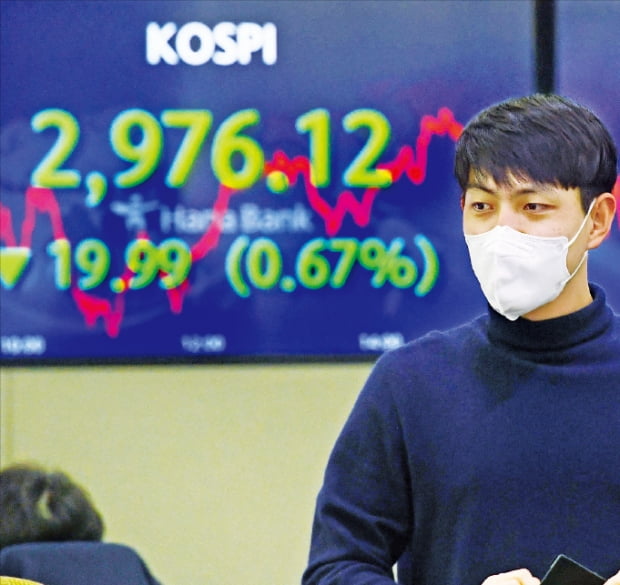
Due to concerns over inflation, the KOSPI index fell to the early 2900s during the intraday on the 9th and closed down 0.67% on the 9th, closing at 2976.12. On this day, dealers are trading at Hana Bank’s dealing room in Myeong-dong, Seoul. Reporter Eun-gu Kang [email protected]
Recently, the interest of stock investors has been focused on the movement of US Treasury yields. This is because the surge in interest rates is shocking the stock market. It is also called’fear of inflation’. As the economic recovery leads to higher interest rates, stock prices are weakening. In particular, growth stocks that surged by pulling future values and reflecting them in the current stock price in the situation of ultra-low interest rates are taking a bigger hit. It is a phenomenon that occurs at the same time in Korea and the United States. In the US, the NASDAQ adjustment centered on large technologies, and in Korea, the battery bio-net stock is showing a sharp decline.
Korean, US, and Chinese growth stocks shake
Battery, bio, and platform companies led the KOSPI index decline on the 9th. It is also a stock that led the liquidity rally last year. LG Chem, third place in market capitalization, ended at 861,000 won, down 3.26%. It fell 16.2% from the 5th of last month (1028,000 won), which recorded the highest point. Celltrion and Samsung Biologics also fell 13.4% and 14.3%, respectively, in the last month. On the other hand, insurance, banking, and steel are strong. In the last month, it has ranked 1st to 3rd in the industry growth rate.

The weakness of growth stocks is more pronounced in the United States. Tesla has plunged 33.7% in the last month. Nvidia (-18.7%), Apple (-14.4%), and Netflix (-11.8%) also fell all at once. The same is true of China. China’s leading growth stocks, such as Alibaba, Tencent, and Jingdong.com, fall 10-20%.
US interest rate close to 1.6%
Growth stocks are falling because interest rates are rising. Growth stocks are formed by reflecting the expected value of the future rather than immediate results. On the other hand, rising interest rates are the product of an economic recovery, which makes investment attractive to value stocks and economically sensitive stocks that are expected to improve earnings.
Because of this, there was a phenomenon in which funds were transferred to value stocks. Seo Jang-hoon, a researcher at Samsung Securities, said, “The background of the recent rise in global interest rates reflects the prospect of an economic recovery.”
The problem is the rate at which interest rates are rising. The recent decline in growth stocks has expanded because the rate of interest rate rise is steeper than expected. Experts initially predicted that the US 10-year Treasury bond rate would be okay up to 1.7% per year. Currently, it has risen to 1.59%. As of the end of January, the 10-year Treasury bond yield was 1.071%. However, it surged in over a month. This rate of increase is steeper than when quantitative easing in May-June 2013, which was the highest level ever, was reduced.
There is no entity to calm the market. The Federal Open Markets Commission (FOMC) of the US Central Bank (Fed) will not be able to engage verbally in the market until the 17th. It’s a blackout period.
Volatility and Adjustment Phase
The domestic stock market is expected to show high volatility for the time being. This is because the won-dollar exchange rate is also rising, and the unfavorable environment for domestic stock markets continues.
The securities industry believes that the KOSPI index is unlikely to undergo a major adjustment. This is because it has been supported at the 2950 line every time it declines. However, it is an analysis that if additional bad news comes out, it can be pushed to the 2800 line. Lee Kyung-min, head of investment strategy at Daishin Securities, said, “The KOSPI index is on the 60th line, where it has shown strong support for a while,” and said, “We have to watch for the time being where it will take its direction.”
It is analyzed that whether or not growth stocks will rebound depends on two events. Growth stocks may receive attention again when a comment on the US Federal Open Market Commission (FOMC), scheduled for the 17th, to calm the rise in interest rates comes out. It is also important to announce the earnings for the first quarter starting next month. Oh Hyun-seok, head of the Samsung Securities Research Center, said, “If the performance is enough to overcome the rise in interest rates, it will be an opportunity for growth stocks to rise again.”
Experts are voicing that the portfolio needs to be adjusted in line with the rising interest rate environment. However, it is an opinion that Korea needs a different approach as the division between growth stocks and value stocks is not clear like the US. Samsung Securities recommends semiconductors and automobiles. It is analyzed that semiconductors and automobiles are both growth stocks and value stocks, which are advantageous in responding.
Experts advised that it is time to focus on’low value’ rather than’high value’ stocks. It is an opinion that interest is needed in stocks with a low PER. Daejun Kim, a researcher at Korea Investment & Securities, said, “In the face of a decline in the index, economically sensitive stocks such as banks, insurance, steel and construction are advantageous.
Reporter Park Uimyung [email protected]
